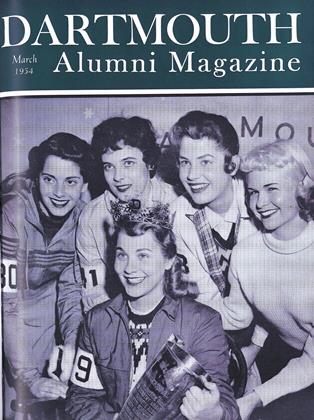ByStanwood Cobb '03. Washington: AvalonPress, 1953. 92 pp. $2.50.
A reverence for Eastern life and ideology has inspired many of Mr. Cobb's seventeen volumes. He offers the present little book, with its sequence of early Taoist dialogues, as a kind of spiritual sedative. How far these are translations he nowhere states and only in a dedication does he hint that his Sage is Laotze, the propounder of the Tao in the 6th century B.C. Wisely avoiding all show of pedantry, he has made these "dramatizations," as he thinks his sources may originally have been, both lucid and highly significant.
The Sage, supremely beatific in his mountain retreat and in his selfless surrender to the Tao ("the way of Nature"), frames thoughts of universal scope that come to him, he says, as perfection comes effortlessly from nature to bird or flower. Men of all walks - peasant, poet, sage, and emperor - seek his counsel. He approves all forms of service, but would purge the spirit of the server of pride, avarice, and all pretense.
Mr. Cobb finds these discourses "fresh as the day on which they were uttered" and values them as a "Gospel of Tranquility." Some of them also seem uncannily to clarify thought on present issues, like the one on the spread of empire by defensive war entitled "War and Peace"; or the one on rival doctrines called "The Superior Man and the Perfect Man." A few are made appealing in story settings like "War and Peace" and "Poetry and Love."
Surely we must all admire the Master who, when offered a gorgeous temple to replace his mountain garden as a school, could say, "Just where I am is the spot Destiny has selected for me. I would change it for no other." The world, we know, "beat a pathway to his door."
 View Full Issue
View Full Issue
More From This Issue
-
 Feature
FeatureHow Much Government?
March 1954 By LAURENCE I. RADWAY -
 Feature
FeatureIn the Public Eye
March 1954 By FRANCIS BROWN '25, -
 Class Notes
Class Notes1929
March 1954 By F. WILLIAM ANDRES, EDWIN C. CHINLUND -
 Class Notes
Class Notes1918
March 1954 By ERNEST H. EARLEY, W. CURTIS GLOVER, RICHARD P. WHITE -
 Class Notes
Class Notes1926
March 1954 By HERBERT H. HARWOOD, H. DONALD NORSTRAND, CARLETON BLUNT -
 Class Notes
Class Notes1952
March 1954 By LT. (JC) ROBERT D. BRACE, ENS. DONALD E. MACLEOD
E. BRADLEE WATSON '02
-
 Books
BooksFLETCHER, BEAUMONT & Cos.,
May 1947 By E. Bradlee Watson '02 -
 Article
ArticleThe Fifty-Year Address
July 1952 By E. BRADLEE WATSON '02 -
 Books
BooksTHE MAGNIFICENT PARTNERSHIP.
March 1955 By E. BRADLEE WATSON '02 -
 Class Notes
Class NotesThe 55th Reunion of 1902
July 1957 By E. BRADLEE WATSON '02 -
 Books
BooksTHE JADE NECKLACE OF LIN SAN KWEI.
MARCH 1959 By E. BRADLEE WATSON '02
Books
-
 Books
BooksFURNITURE MARKETING.
MAY 1957 By CLYDE E. DANKERT -
 Books
BooksTHE SABLE AND THE GIRL
MARCH 1930 By E. P. Kelly -
 Books
BooksCOLOMBIA: LA PRESENCIA PERMANENTE.
December 1961 By ELIAS L. RIVERS -
 Books
Books1600 PENNSYLVANIA AVENUE.
July 1960 By FRANK SMALLWOOD '51 -
 Books
BooksAlumni Publications
FEBRUARY, 1927 By Harold R. Bruce -
 Books
BooksARBITRATION OF LABOR DISPUTES
October 1946 By Herman Feldman

